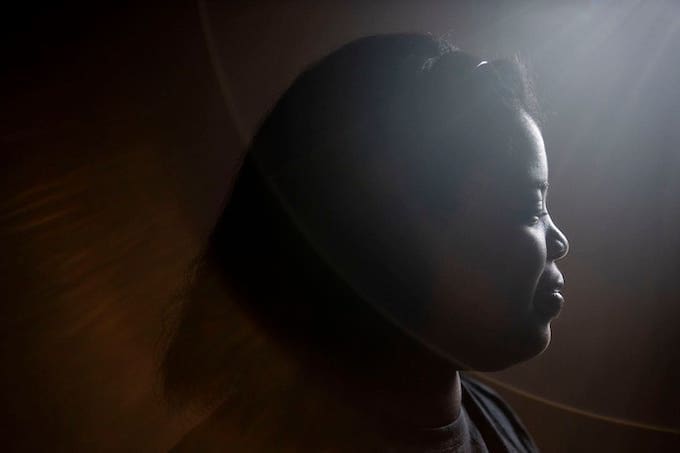JACKSON, Miss. — Cheryl Gray had sat through so many presentations about programs to lift herself out of poverty that she could practically recite all the advice. But the one she heard last November seemed too generous to be true.
A nonprofit organization was looking to give 20 African American single mothers living in public housing $1,000 each month for a year. They’d be able to use the money in any way they pleased.
“I could do anything?” Gray, a 25-year-old single mother of two, recalled thinking, because this was not the way assistance programs typically worked.
For decades, Republicans and Democrats alike have tried to push families out of poverty by adding restrictions to government welfare programs. There were work mandates, time limits, benefit caps — rules aimed at pointing families toward what the government thinks are good choices.
Now, there is increasing interest in trying out the reverse. Here, in the cradle of the South, the women would be a part of one of the first pilot programs in the country to assess a seemingly simple solution to systemic poverty: giving people money — no strings attached.
The idea of guaranteed income is gaining traction, from the presidential debate stage to Silicon Valley, where tech titans such as Mark Zuckerberg and Elon Musk have promoted it as a way to fend off a gloomy future in which automation and climate change eliminate millions of jobs. Activists associated with the Movement for Black Lives are advocating guaranteed income for African Americans as a form of reparations for slavery.
Now, some Democratic hopefuls have promoted the concept as a way to reduce wealth inequality. Sen. Cory Booker (D-N.J.) has proposed providing every child born in the United States $1,000 in interest-bearing accounts known as “baby bonds.” Sen. Kamala D. Harris (D-Calif.) is pitching guaranteed tax refunds of up to $6,000 for families making less than six figures. And entrepreneur Andrew Yang has staked his entire campaign on a “universal basic income” — giving $1,000 a month to every American adult.
Opponents of such programs argue that they would add at least billions to the deficit while providing too little oversight of recipients, who might abuse the privilege — claims that supporters say are rooted in stereotypes.
“Americans will work even harder when they’re given the resources to get ahead,” Yang said recently on CBS’s “Face the Nation.” “The money will go right into local Main Street businesses, to car repairs, to day care, to Little League.”

In Jackson, Gray just wanted to escape poverty. She had grown up poor and was pregnant at 16, which is when she started hearing people say she’d “never become nothing.”
“I wanted to show I could do it all on my own,” she said.
She tried to defy the stereotypes by staying in school and going to Jackson State University. Her bachelor’s degree in social work led her to $40,000 in student loan debt, a busted car and a cleaning job that paid no more than $11 an hour.
She had gotten used to the sound of gunshots while living in government-subsidized housing. The hallways smelled like old cigarettes, and her two children — Alonzo, 9, and Allonah, 7 — slept in the same room. An emptiness surrounded them: vacant lots and pothole-laden streets with no sidewalks, boarded-up houses and abandoned strip malls.
She tried to remain positive by telling herself what the rapper Tupac Shakur once said: The things that you do as a caterpillar make you whatever butterfly you’re going to be. She kept participating in programs she thought would help, going to presentation after presentation by local nonprofit groups. But over time, being one pothole away from a financial disaster and trying to tend to her children after working overnight, her ambition shriveled.
“I’m not even sure what I want to do now,” Gray said recently. “I just don’t want to be living like this.”
With the new money, she figured she could pay for graduate school so she could get a job with decent hours. Maybe she could find a new place to live.
But the money came with a natural consequence for families using the social safety net. More income triggered decreases in government help. She lost the $150 she received each month for food stamps. Because her rent was linked to her income, her monthly housing payment rose from $300 to $757.
***


For all the résumé writing and programming that the Springboard to Opportunities workforce development program does to launch its clients into the middle class, its chief executive found that mothers still had one continual need.
“My mothers need cash,” said Aisha Nyandoro, also helped to establish the Jackson-based program.
They fretted over bills. They’d miss work because they couldn’t repair a car, or because they couldn’t afford child care. “I just need $25,” Nyandoro recalled one mother telling her. The woman’s child had qualified for a citywide science fair, but she didn’t have enough cash to pay for registration.
The requirements accompanying public assistance such as food stamps and housing vouchers left her clients “pigeonholed,” without the flexibility to craft budgets based on their specific situations, Nyandoro said.
This search for cash — not politics or job-sapping technology — is why she said she sought out a fledgling foundation co-chaired by Facebook co-founder Chris Hughes called the Economic Security Project, which is sponsoring guaranteed-income projects in Stockton, Calif., and Chicago.
Trying the experiment in conservative Mississippi, though, made the program inherently different.
The women live in a state with some of the most restrictive social service systems in the country. Minimum wage is $7.25. And a 2018 study by the National Conference of State Legislatures showed that Mississippi had the harshest penalties in the country for recipients not meeting work requirements for food stamps.
And yet, in an area where jobs were scarce and transportation options were lacking, the social safety net was the most secure source of income clients had. Some worried about how much their benefits would be cut if they took the monthly checks from Nyandoro’s program, and about the bureaucracy that might be involved if they needed to reclaim those benefits.
Of the 110 women eligible to be a part of the program, only 38 applied.


The 20 women selected for the experiment in November 2018 earned an average of $12,000 a year at the time. Fifteen of the women were working. Twelve had reported being so short on cash that they had used an emergency lender in the preceding six months.
The women started receiving the checks in December. Many of them kept their participation secret because they were afraid that neighbors and relatives might ask for money. To protect their privacy, Nyandoro held a meeting in a place that people in their community rarely ventured: a gourmet ice-pop shop in an upscale neighborhood about a 10-minute drive away.
Some of the women talked about their gift-filled Christmases and sported new hairstyles. Some said they took a sick day for the first time. They began paying off overdue electricity bills and high-interest loans.
Kira Johnson, a social worker, asked how much money the women had saved.
“I blew all of it,” Gray recalled. “It only took a weekend.”
Most of the women said the same thing. In a month, nearly all of the money had vanished.
The situation exposed a truth about poverty. The women knew how to make minimum-wage paychecks stretch, Johnson said, but they had little experience with discretionary income.
“Then, they asked if we were going to hand them the next check,” Johnson said.
When Johnson heard the request, she realized something else: Before the program, most of the women had not used a bank account.
***


The discussion at the shop exposed another truth for the women: Receiving money would not be enough on its own to lift them out of poverty. If they were going to save anything, the women said they would need a little more guidance and support about how to do it. Johnson set them up with a financial adviser who taught them about savings accounts, interest rates and building credit.
Soon, Johnson said, the women began sharing small victories. One woman used the extra money to take time off and finish community college. Some sent their children to day camp. One woman filled her gas tank to drive her children to see their grandfather in Pennsylvania. The children had never met him.
At the end of six months, none of the women reported using an emergency lender. Nearly all said they had enough money to buy school supplies, when fewer than half had said that before. They reported cooking more balanced meals, visiting the doctor and attending church more often.
“The beauty of all of this has just been how folks are light,” Nyandoro said. “They aren’t walking around with the heaviness of life that, unfortunately, so many times low-income folks have to carry.”
Many women who were employed found better jobs. But, despite Yang’s prediction, the number of women who were in the workforce did not change. Similar results were reported from a guaranteed-income study that took place in Finland.
Eyitayo Onifade, who is the director of the Center for Children and Families at Clark Atlanta University who is evaluating the Jackson program, said wages were so low in the city that there was not much incentive to choose employment, particularly for single mothers.
“The women attached to the workforce were not making much more money than the women who were not attached to the workforce,” Onifade said. “So some make the choice that they’d rather spend time raising their children.”
Gray’s relationship with money changed dramatically. She used to want to put her children in the hottest clothes to prove that she was providing for them, but now saw the value of visiting the clearance racks. She paid off $4,000 in credit card debt. She found an $11-an-hour teaching job at a preschool and another part-time job, so she could save more money. As her new bank account grew from zero to $1,000 to $2,000, she began looking to leave the projects.
When a friend told her about a program to help low-income families buy houses, she decided to apply.
In April, Gray learned that her application had been approved. A local affiliate with the faith-based Habitat for Humanity would provide her with a no-interest, 30-year mortgage after a $1,000 down payment for a renovated home.
Gray had to agree to attend financial literacy workshops and complete 125 hours of “sweat equity” — hammering nails, painting and doing other tasks with the volunteers that Habitat uses to keep costs low.
On a summer evening, she took Alonzo and Allonah to the place that would be their new home. It is in a quiet neighborhood, and it has a large front yard and yellow siding. Through the windows, they could see that the home had been gutted.
“I like it, Mom,” Allonah recalled saying.
“I don’t like it,” Alonzo said.
The windows were so big that he worried he might get hurt if a bullet came through.
***


A few weeks later, Alonzo and Allonah stuffed their new backpacks with erasers, colored pencils and notebooks. Gray put on a pair of leggings and a ball cap.
It was the children’s first day of school. And, according to the calculations she kept in a little book, it was Gray’s the last day volunteering to work on the house.
After dropping off the children, she drove to the work site. She stepped out of her car and took a deep breath. Pine trees perfumed the air.
“You working today?” asked David Smith, the construction manager. “It’s going to be pretty tough. The heat index is 110 degrees.”
“Today’s my last day,” Gray said.
“Really?” Smith said. He was eager to show the progress they had made since the last time Gray volunteered. The two walked inside. It was still mostly wood framing and cinder blocks, but he asked her to envision a dream more full.
At one end of the house were rooms for her children, and she wondered how easy it would be for them to adjust having more space. Then, they entered the master bedroom, with a closet so big she couldn’t possibly have enough clothes to fill it.
“I’m going to have my own dishwasher?” she said as he showed her the kitchen area. Then she mouthed, “Wow.”
Kira Johnson, the social worker, pulled up to the site. She smiled at Gray’s new home. This place was a big step, but Johnson reminded her that a new house was only one of the ways to break out of poverty.
Johnson asked about her son, who had failed his reading assessment last year. Gray was now spending $60 a week to send her children to tutoring.
“Are you reading to him?” Johnson asked. Gray told her she tried, but that sometimes she was just too sleepy after work. She said he could read the words but was frustrated by not knowing their meaning.
“What the heck is wrong with me?” Gray recalled her son saying.


Then there was Gray’s own education. She told the social worker it was still too expensive to carry out her plan to go to school full time. And there was no time to take classes when she was still working two jobs.
“Maybe you should just take a course,” Johnson suggested.
“Okay,” Gray said, looking away.
“You’re saying okay, but your face is not saying okay.”
“I just think school is down the road,” Gray said.
Still, Gray was gaining hope. Nine months into the program, she had saved close to $13,000.
“I’m making something of myself,” she said. “I don’t worry that much about money no more.”
Outside, Smith was gathering the group of volunteers who had come to help Gray build her home. They were about to rush inside.
“All right everyone, let’s go inside,” he said. “Let’s go! Open up the windows!”





















